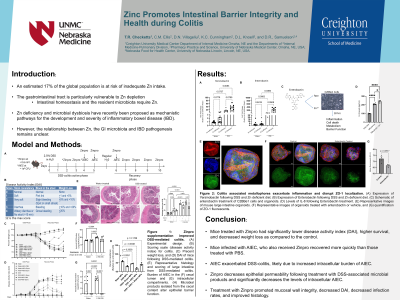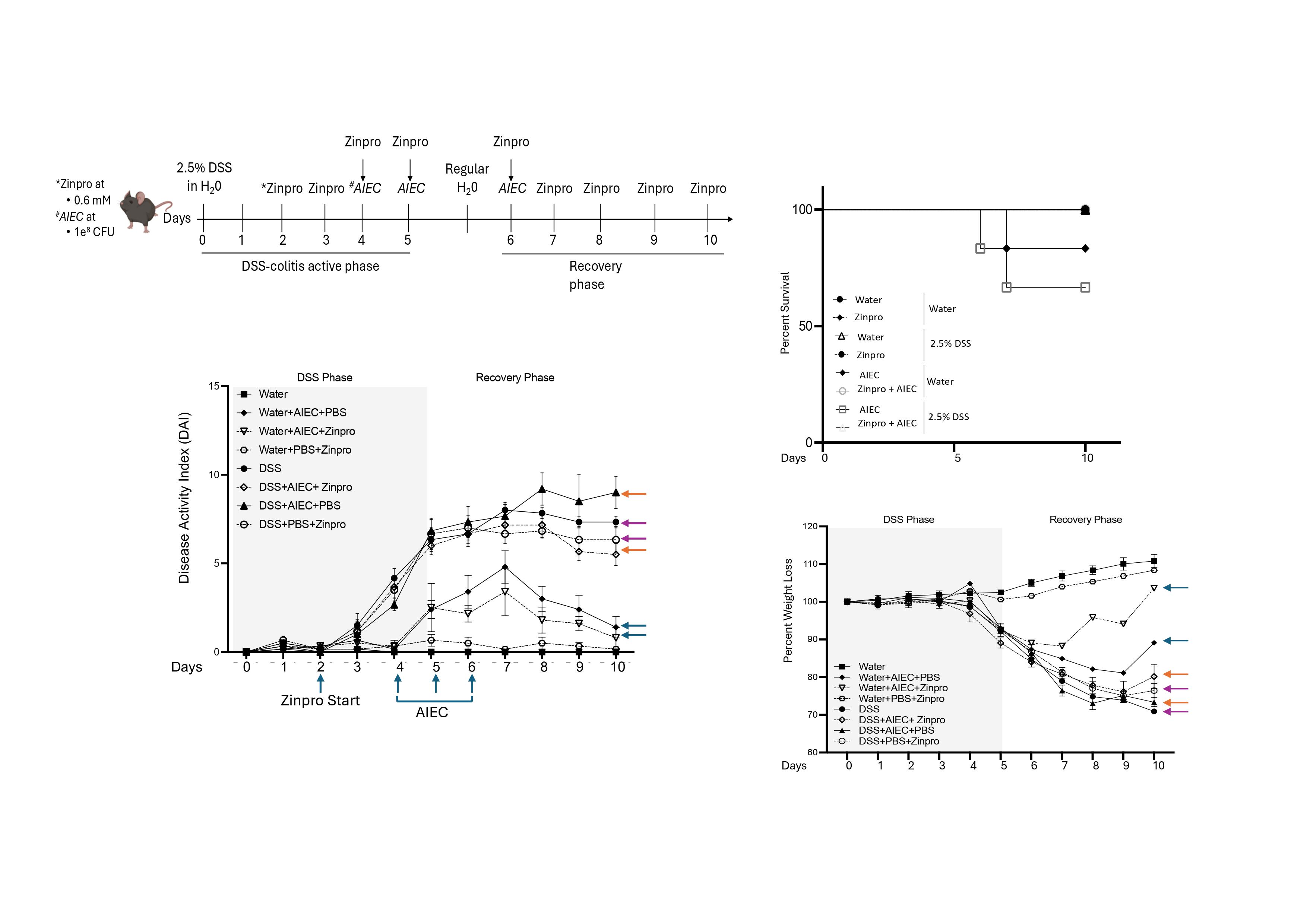Monday Poster Session
Category: IBD
P2631 - Zinc Promotes Intestinal Barrier Integrity and Health During Colitis
Monday, October 28, 2024
10:30 AM - 4:00 PM ET
Location: Exhibit Hall E

- TC
Thomas Checketts, DO
Creighton University
Omaha, NE
Presenting Author(s)
Thomas Rees Checketts, DO1, Daniel Villageliu, BS2, Daren L Knoell, BS3, Christi M Ellis, BS3, Kelly C Cunningham, MS3, Derrick Samuelson, PhD3
1Creighton University, Omaha, NE; 2University of Nebraska College of Medicine, Omaha, NE; 3Nebraska Medical Center, Omaha, NE
Introduction: An estimated 17% of the global population is at risk of inadequate Zn intake. Even slight Zn deprivation leads to significantly impaired physiological functions. The gastrointestinal tract is particularly vulnerable to depletion as maintenance of intestinal homeostasis and the resident microbiota require Zn. Zn deficiency mediating loss of intestinal homeostasis and microbial dysbiosis have recently been proposed as mechanistic pathways for the development and severity of inflammatory bowel disease (IBD). However, the relationship between Zn , the GI microbiota and IBD pathogenesis remains unclear.
Methods: Utilizing both in vivo and in vitro models, we investigated the relationship between zinc deficiency, pathobiont infection, and IBD severity. We utilized Dextran sodium sulfate (DSS) to induce colitis. Mice consumed 2.5% DSS in their drinking water for ten days before sacrifice. On days 2-10, they were gavaged daily with 200 mg/dose of Zinpro. Select groups were gavaged Adherent-invasive E. coli (1x108 CFU) on days four, five, and six. We assessed the effects of Zn supplementation using three primary outcomes; 1) increases/decreases in Disease Activity Index (DAI), 2) gross pathology changes, and 3) histological evaluation. Using an in vitro approach we assessed epithelial barrier function. Intestinal cell cultures were treated with microbial products isolated from mice treated with DSS versus mice given water. Barrier function was measured via transepithelial electrical resistance.
Results: Mice treated with Zinpro had significantly lower DAI, higher survival, and decreased weight loss as compared to the control. A small group of mice infected with AIEC, simulating a pathobiont bloom, who also received zinpro recovered more quickly than those treated with phosphate buffer solution. AIEC also exacerbated DSS-colitis, likely due to increased intestinal burden of AIEC. Most strikingly, we demonstrated that Zinpro decreases membrane permeability following treatment with DSS-associated microbial products and significantly decreases the levels of intracellular AIEC. Treatment with Zinpro promoted mucosal wall integrity, decreased DAI, decreased infection rates, and improved histology.
Discussion: Together, this data suggests that Zinpro treatment significantly decreased colitis severity. Zinc supplementation early during colitis with subsequent pathobiont (AIEC) infection helped maintain intestinal wall membrane integrity.

Disclosures:
Thomas Rees Checketts, DO1, Daniel Villageliu, BS2, Daren L Knoell, BS3, Christi M Ellis, BS3, Kelly C Cunningham, MS3, Derrick Samuelson, PhD3. P2631 - Zinc Promotes Intestinal Barrier Integrity and Health During Colitis, ACG 2024 Annual Scientific Meeting Abstracts. Philadelphia, PA: American College of Gastroenterology.
1Creighton University, Omaha, NE; 2University of Nebraska College of Medicine, Omaha, NE; 3Nebraska Medical Center, Omaha, NE
Introduction: An estimated 17% of the global population is at risk of inadequate Zn intake. Even slight Zn deprivation leads to significantly impaired physiological functions. The gastrointestinal tract is particularly vulnerable to depletion as maintenance of intestinal homeostasis and the resident microbiota require Zn. Zn deficiency mediating loss of intestinal homeostasis and microbial dysbiosis have recently been proposed as mechanistic pathways for the development and severity of inflammatory bowel disease (IBD). However, the relationship between Zn , the GI microbiota and IBD pathogenesis remains unclear.
Methods: Utilizing both in vivo and in vitro models, we investigated the relationship between zinc deficiency, pathobiont infection, and IBD severity. We utilized Dextran sodium sulfate (DSS) to induce colitis. Mice consumed 2.5% DSS in their drinking water for ten days before sacrifice. On days 2-10, they were gavaged daily with 200 mg/dose of Zinpro. Select groups were gavaged Adherent-invasive E. coli (1x108 CFU) on days four, five, and six. We assessed the effects of Zn supplementation using three primary outcomes; 1) increases/decreases in Disease Activity Index (DAI), 2) gross pathology changes, and 3) histological evaluation. Using an in vitro approach we assessed epithelial barrier function. Intestinal cell cultures were treated with microbial products isolated from mice treated with DSS versus mice given water. Barrier function was measured via transepithelial electrical resistance.
Results: Mice treated with Zinpro had significantly lower DAI, higher survival, and decreased weight loss as compared to the control. A small group of mice infected with AIEC, simulating a pathobiont bloom, who also received zinpro recovered more quickly than those treated with phosphate buffer solution. AIEC also exacerbated DSS-colitis, likely due to increased intestinal burden of AIEC. Most strikingly, we demonstrated that Zinpro decreases membrane permeability following treatment with DSS-associated microbial products and significantly decreases the levels of intracellular AIEC. Treatment with Zinpro promoted mucosal wall integrity, decreased DAI, decreased infection rates, and improved histology.
Discussion: Together, this data suggests that Zinpro treatment significantly decreased colitis severity. Zinc supplementation early during colitis with subsequent pathobiont (AIEC) infection helped maintain intestinal wall membrane integrity.

Figure: Moving in clockwise fashion
Top Left – graph demonstrating the day(s) of administration of DSS, Zinpro, and AIEC.
Top Right – Percent survival
Bottom Right – Percent weight loss
Bottom Left – Disease Activity Index
Top Left – graph demonstrating the day(s) of administration of DSS, Zinpro, and AIEC.
Top Right – Percent survival
Bottom Right – Percent weight loss
Bottom Left – Disease Activity Index
Disclosures:
Thomas Rees Checketts indicated no relevant financial relationships.
Daniel Villageliu indicated no relevant financial relationships.
Daren L Knoell indicated no relevant financial relationships.
Christi M Ellis indicated no relevant financial relationships.
Kelly C Cunningham indicated no relevant financial relationships.
Derrick Samuelson indicated no relevant financial relationships.
Thomas Rees Checketts, DO1, Daniel Villageliu, BS2, Daren L Knoell, BS3, Christi M Ellis, BS3, Kelly C Cunningham, MS3, Derrick Samuelson, PhD3. P2631 - Zinc Promotes Intestinal Barrier Integrity and Health During Colitis, ACG 2024 Annual Scientific Meeting Abstracts. Philadelphia, PA: American College of Gastroenterology.
